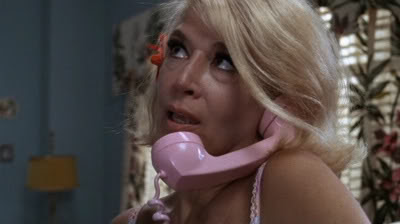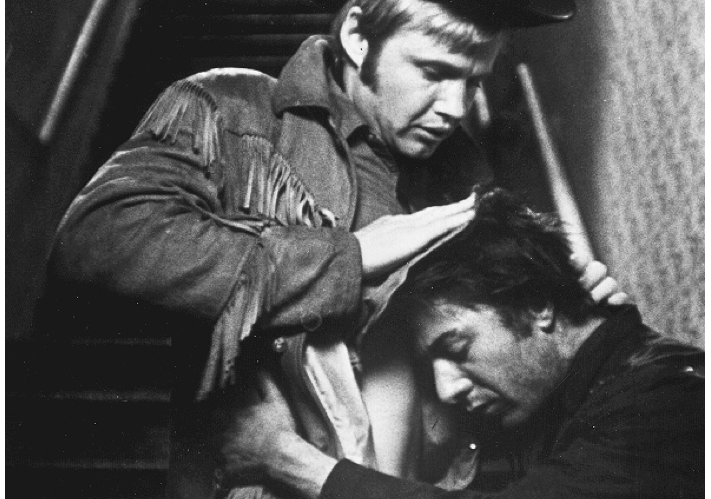← Back to Reviews
in
3. Midnight Cowboy (John Schlesinger, 1969)
Sometimes you watch a film and it literally changes the way you perceive cinema, art and life. It might be a gradual process and take several viewings, but you understand, from the first time through, that you are witnessing a kind of storytelling genius which you have never seen before and, while being very entertaining, it just hits you in your psyche on a uniquely-deep level. Midnight Cowboy would be that film for me. I haven't read James Leo Herlihy's novel, although I'm sure that it's a powerful book, but I find it hard to believe that it's told in the same manner as director Schlesinger and scripter Waldo Salt fashioned for this film. The story itself is quite simple. Naive young Texas rube Joe Buck (Jon Voight) decides to head to New York City where he plans to parlay his looks and lovemaking skills into becoming a rich stud for hire. After a misadventure with an older woman (the hilarious Sylvia Miles) who lives in a penthouse apartment, he comes across a health-challenged hustler named Enrico Salvatore Rizzo (Dustin Hoffman) whose known as Ratso by his enemies. Ratso quickly becomes Joe's enemy.

We find out, actually on the bus ride from Texas to NYC, that Joe is carrying some major baggage in the form of a couple of traumatic experiences which happened to him earlier in his life. These scenes are presented quickly, with no explanation and almost surrealistically, so it might confuse the first time viewer as to what their true meanings are. However, I find the scenes to be a brilliant directorial device to help us get into the heart and soul of Joe Buck. I wouldn't argue with you if you think that Schlesinger is showing off in these hauntingly-dazzling scenes, which come off as a sort of cross between the techniques of Fellini and Alain Resnais. However, I will argue that they certainly strengthen the film, and if you breathe a little and give them time to accumulate, I believe you will find that they work semi-subliminally to tell the story better in a pure cinematic fashion. As I said above, this movie altered my perceptions on what film can communicate.

Eventually, Joe finds Ratso and would like nothing better to do than kill him for his cheating ways. Instead Ratso offers Joe a place to stay. Neither one has any friends, and NYC is a particularly harsh place to try to live on your own in the winter, especially when you have no visible signs of income. Joe turns out to be a bust as a ladies' man, so he has to try his luck on "the other side of the tracks", and Ratso seems to be getting sicker, especially living in the condemned building the men share.

The strength of the film lies in the way that you slowly see how two dysfunctional people can come together to honestly care about each other. Deep down, Midnight Cowboy is a love story. True, it's between two men, but it's strictly platonic, and it's almost amazing how you see them slowly reaching out to help each other even while they continue to bicker about which of them is the more pathetic. Joe Buck's desire to get Ratso on a bus to Florida to improve his health always gets to me. Plus Voight and Hoffman give toweringly-brave performances. By the way, I haven't mentioned this more than once, but this film is very funny. I realize that it's a serious drama, which some may find as too bleak, but most of the films in my Top List I find to have high levels of wit, and this one is near the top in that department. It also has wonderful music, beginning with Nilsson's version of "Everybody's Talking", through John Barry's affecting score, and the awesome harmonica solos of Toots Thielemans. As usual, I left out many important elements and characters which only add to the film's richness and complexity. I truly love this movie, and I hope you do too.
Sometimes you watch a film and it literally changes the way you perceive cinema, art and life. It might be a gradual process and take several viewings, but you understand, from the first time through, that you are witnessing a kind of storytelling genius which you have never seen before and, while being very entertaining, it just hits you in your psyche on a uniquely-deep level. Midnight Cowboy would be that film for me. I haven't read James Leo Herlihy's novel, although I'm sure that it's a powerful book, but I find it hard to believe that it's told in the same manner as director Schlesinger and scripter Waldo Salt fashioned for this film. The story itself is quite simple. Naive young Texas rube Joe Buck (Jon Voight) decides to head to New York City where he plans to parlay his looks and lovemaking skills into becoming a rich stud for hire. After a misadventure with an older woman (the hilarious Sylvia Miles) who lives in a penthouse apartment, he comes across a health-challenged hustler named Enrico Salvatore Rizzo (Dustin Hoffman) whose known as Ratso by his enemies. Ratso quickly becomes Joe's enemy.

We find out, actually on the bus ride from Texas to NYC, that Joe is carrying some major baggage in the form of a couple of traumatic experiences which happened to him earlier in his life. These scenes are presented quickly, with no explanation and almost surrealistically, so it might confuse the first time viewer as to what their true meanings are. However, I find the scenes to be a brilliant directorial device to help us get into the heart and soul of Joe Buck. I wouldn't argue with you if you think that Schlesinger is showing off in these hauntingly-dazzling scenes, which come off as a sort of cross between the techniques of Fellini and Alain Resnais. However, I will argue that they certainly strengthen the film, and if you breathe a little and give them time to accumulate, I believe you will find that they work semi-subliminally to tell the story better in a pure cinematic fashion. As I said above, this movie altered my perceptions on what film can communicate.

Eventually, Joe finds Ratso and would like nothing better to do than kill him for his cheating ways. Instead Ratso offers Joe a place to stay. Neither one has any friends, and NYC is a particularly harsh place to try to live on your own in the winter, especially when you have no visible signs of income. Joe turns out to be a bust as a ladies' man, so he has to try his luck on "the other side of the tracks", and Ratso seems to be getting sicker, especially living in the condemned building the men share.

The strength of the film lies in the way that you slowly see how two dysfunctional people can come together to honestly care about each other. Deep down, Midnight Cowboy is a love story. True, it's between two men, but it's strictly platonic, and it's almost amazing how you see them slowly reaching out to help each other even while they continue to bicker about which of them is the more pathetic. Joe Buck's desire to get Ratso on a bus to Florida to improve his health always gets to me. Plus Voight and Hoffman give toweringly-brave performances. By the way, I haven't mentioned this more than once, but this film is very funny. I realize that it's a serious drama, which some may find as too bleak, but most of the films in my Top List I find to have high levels of wit, and this one is near the top in that department. It also has wonderful music, beginning with Nilsson's version of "Everybody's Talking", through John Barry's affecting score, and the awesome harmonica solos of Toots Thielemans. As usual, I left out many important elements and characters which only add to the film's richness and complexity. I truly love this movie, and I hope you do too.
